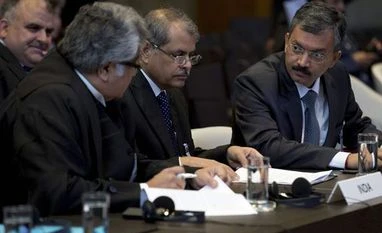The International Court of Justice (ICJ) will pronounce its verdict on the Kulbhushan Jadhav case on Thursday, just 10 days after India approached it demanding immediate suspension of the death sentence given to its former Navy officer by a Pakistan military court.
"The ICJ, the principal judicial organ of the United Nations, will deliver its order on the request for the indication of provisional measures made by India in the Jadhav Case (India v. Pakistan), tomorrow on Thursday 18 May 2017. A public sitting will take place at 12 noon at the Peace Palace in The Hague, during which Judge Ronny Abraham, President of the Court, will read the court's decision," the international court said in a release on Wednesday.
On Monday, India and Pakistan crossed swords at the ICJ over Jadhav's case, with New Delhi demanding the immediate suspension of Jadhav's death sentence and Islamabad calling India's application "unnecessary" and "misconceived".
Before Monday's hearing, the ICJ had also made it clear that "pending the meeting of the court, the President may call upon the parties to act in such a way as will enable any order the court may make on the request for provisional measures to have its appropriate effects."
Jadhav, a retired navy officer, was accused of being an operative of the Indian intelligence agency, RAW, and arrested in Balochistan on March 3, 2016. Subsequently, on May 8 this year, India moved a petition in the UN seeking justice for Jadhav after being denied 16 consular accesses, alleging a violation of the Vienna Convention on Consular Relations by Pakistan.
Here are the arguments India and Pakistan advanced while pushing their respective positions:
1) India asks ICJ to suspend Jadhav's death sentence: India demanded the immediate suspension of Jadhav's death sentence, expressing fears that Pakistan could execute him even before the hearing at the ICJ was over.
2) India says immediate threat to Jadhav's life: "Jadhav has not got the right to get proper legal assistance and the right to consular access. There is an immediate threat to him to be executed even before a decision is passed," joint secretary in the Ministry of External Affairs Deepak Mittal told the court in his opening remarks.
3) Pakistan has violated the Vienna Convention: Representing India, lead attorney Harish Salve said, "The execution of the death sentence cannot be done while this court is hearing the appeal. Else, it will be a violation of the Vienna Convention."
4) India says Jadhav was kidnapped: India, in its appeal to the ICJ, had asserted that Jadhav was kidnapped from Iran where he was involved in business activities after retiring from the Indian Navy. India denies that he has any connection with the government.
5) India says Jadhav's human rights violated: India also argued that Jadhav's human rights were violated in the conduct of the trial. Human rights treated as "basics" all over had been thrown to the wind by Pakistan and the trial had been vitiated, India argued. Though Pakistan says Jadhav has the right to appeal, two-star generals will hear his mercy plea, Salve stressed, questioning the impartiality of the process. "The need for a wholesome compliance is greater when charges are serious. We want appropriate legal representation for Kulbhushan Jadhav," he said.
6) Pak says India's application should be dismissed: Following India's arguments, Pakistan, in its submission before the UN's highest judicial body, said India's application on Jadhav was "unnecessary and misconceived" and must be dismissed.
7) Pak accuses India of conducting 'political theatre': India has seen it fit to use the ICJ as a stage for "political theatre" but "we will not respond in kind", Mohammad Faisal of the Pakistan Foreign Office said in his opening remarks in response to India's submissions earlier in the day.
8) Pak says Vienna Convention not applicable: Vienna Convention provisions on consular access were not intended for a "spy" involved in terror activities, Pakistan asserted.
9) Pak claims Jadhav not to be executed immediately: Representing Pakistan, lawyer Khawar Qureshi said India has sought to persuade this court that Pakistan intends to execute Jadhav within days. "Simply by referring to the clemency process available as a right to commander Jadhav. A period of 150 days is provided for in this regard which even if (it) started on April 10, 2017, which is the date of conviction at first instance, could extend to well beyond August 2017. There is also, of course, the potential for the writ petition of the High Court to be invoked as we believe India must be well aware," he said.
10) Pak accuses India of suspicious silence: Faisal, in his submission before the court, claimed that India had been unable or "perhaps more accurately unwilling to provide" an explanation for Jadhav's passport which has a Muslim name on it. "We submit that India's silence is telling. Indeed. India could and should have responded to a letter of request dated January 23, 2017, seeking India's assistance to investigate the criminal activity and links with people of India which commander Jadhav has revealed," he said.
With inputs from agencies
Unlock 30+ premium stories daily hand-picked by our editors, across devices on browser and app.
Pick your 5 favourite companies, get a daily email with all news updates on them.
Full access to our intuitive epaper - clip, save, share articles from any device; newspaper archives from 2006.
Preferential invites to Business Standard events.
Curated newsletters on markets, personal finance, policy & politics, start-ups, technology, and more.
)